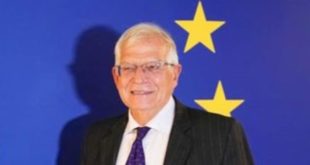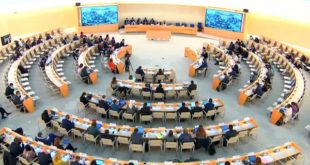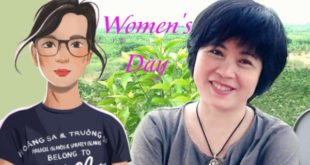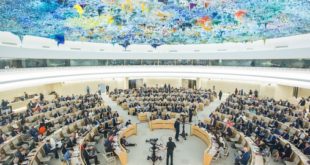PARIS, 16 July 2010 (VIETNAM COMMITTEE) – Mr. Vo Van Ai, President of the Paris-based Vietnam Committee on Human Rights, an affiliate of the International Federation of Human Rights (FIDH) welcomed Vietnam’s publication of the first issue of a monthly human rights magazine, but expressed concern that the journal is designed as a propaganda tool to justify Communist Party policies and rebuff international criticisms, rather than a genuine forum for debate on the promotion of human rights.
“The government says the magazine is aimed to disseminate the Communist Party and state’s policies on human rights and help fight ‘erroneous and hostile allegations’”, said Vo Van Ai. “But if Vietnam really wants to convince its citizens and the international community, it should make concrete human rights progress, beginning by implementing core UN human rights instruments such as the International Covenant on Civil and Political Rights (ICCPR) and the International Covenant on Economic, Social and Cultural Rights (ICESCR) to which it acceded in 1982, almost 30 years ago”.
Mr. Ai, who routinely testifies on Vietnamese issues at the United Nations Human Rights Council in Geneva, stressed that those who criticize Vietnam’s human rights violations are not “hostile forces” seeking to “interfere in Vietnam’s development”. “Vietnam should understand that human rights will enhance, not undermine Vietnam’s development. We believe that the Vietnamese people have the right to enjoy the basic rights enshrined in the ICCPR/ICSER and in the Vietnamese Constitution, and we simply ask Vietnam to respect its binding international obligations”.
Although Vietnam has ratified several core human rights treaties, Mr. Ai noted that it fails systematically to comply with basic UN mechanisms. Whereas states are required to make regular 2-yearly reports on the treaties they have ratified, Vietnam’s report on the ICSER is over 15 years overdue. During its Universal Periodic Review before the UN Human Rights Council in May 2009, Vietnam rejected over 40 recommendations by member states to make concrete reforms in the domains of freedom of expression, religion and association. Whilst for the first time, Vietnam has invited two UN experts to visit Vietnam this year (Ms. Gay McDougall, Independent Expert on Minority issues and Ms Magdalena Sepulveda, Independent Expert on human rights and extreme poverty), it has systematically rejected requests by the UN Special Rapporteurs on Freedom of Expression, Freedom of Religion, Human Rights Defenders and the UN Working Group on Arbitrary Detention to visit Vietnam. Indeed, Vietnam has allowed no visits by UN experts since 1998, when the Special Rapporteur on Religious Intolerance raised concerns on religious freedom abuses. Vietnam then announced it would never again “accept any individuals or organizations coming to investigate religious freedom or human rights”.
Despite repeated demands by several UN human rights bodies to reform its legal system, Vietnam has adopted an arsenal of restrictive laws and domestic regulations criminalizing the peaceful exercise of freedom of opinion, expression, religion, assembly and association, in gross violation of the ICCPR. Most disturbing, stressed Vo Van Ai, are the vaguely-defined “national security” provisions in the Vietnamese Criminal Code that condition the exercise of human rights on “compliance with the policies and interests of the state”. They include ambiguous offenses such as “undermining national solidarity, sowing divisions between religious and non-religious people”, (article 87), “conducting propaganda against the Socialist Republic of Vietnam” (Article 88), “abusing democratic freedoms to encroach on the interests of the state” (article 258), or “espionage” (Article 80). These crimes, which make no distinction between violent acts such as terrorism and the peaceful exercise of freedom of expression, are punishable by harsh prison terms, including life imprisonment. Seven of them carry the death penalty. In January 2010, pro-democracy activist Tran Huynh Duy Thuc was sentenced to 16 years in prison under Article 79 on “activities aimed at overthrowing the people’s administration” simply for expressing peaceful opposition views via the Internet, along with over 20 cyber-dissidents and pro-democracy activists.
“Publishing a human rights magazine will not help to change the human rights situation in Vietnam”, said Mr. Ai. “The international community and the Vietnamese people need more than cosmetic gestures. As President of ASEAN and Chairman of the ASEAN Intergovernmental Human Rights Commission, the only inter-state human rights mechanism in Asia, Vietnam must make concrete steps to advance and protect democratic freedoms and human rights”.
Mr. Ai, who was received by US Secretary of State Hilary Clinton in Krakow this month at the 10th Anniversary of the Community of Democracies in a private meeting with dissidents from 9 countries, stressed the importance of protecting civil society in Vietnam. In this meeting, he called on Secretary Clinton to press Vietnam to repeal restrictive laws on freedom of association to enable the emergence of independent NGOs, and to authorize the publication of an independent newspaper as a gesture of its commitment to freedom of expression. The US Secretary of State will be in Vietnam at the end of this month to attend the ASEAN Regional Forum.
 Quê Me Quê Me: Action for democracy in Vietnam & Vietnam Committee on Human Rights
Quê Me Quê Me: Action for democracy in Vietnam & Vietnam Committee on Human Rights




